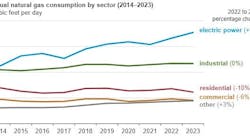Sam Fletcher
Senior Writer
HOUSTON, Jan. 14 -- Energy prices dropped to a 3-week low on the New York market Jan. 11 as traders listened to economists' worries that a possible recession could reduce demand, even as escalating violence in Nigeria and Iraq threatened supplies.
Turkish soldiers last week directed artillery fire against Kurdish rebels in northern Iraq who have been raiding into Turkey. On Jan. 11, militants claimed they remotely triggered an electronic explosive device that sparked a fire on an oil tanker in Port Harcourt, Nigeria. Moreover, the rebels claimed they had help from energy industry employees and Nigeria's intelligence services in planting that bomb.
Nigerian rebels unilaterally ordered a ceasefire after the inauguration of President Umaru Yar'Adua in May to give him time to address government corruption and economic underdevelopment of the oil-rich Niger Delta. But attacks on foreign-operated oil facilities are on the rise since the recent arrest of the top leader of the Movement for the Emancipation of the Niger Delta. Over the weekend, that group offered to halt attacks if its leader is released.
Meanwhile, gunmen assassinated a Sunni judge and his driver Jan. 14 as they drove to work in Baghdad. In another incident 35 miles north of Baghdad, at least two Iraqi police officers were killed and others were trapped in the rubble when an apparently booby-trapped house exploded as they searched it.
Analysts in the Houston office of Raymond James & Associates Inc. said news of violence in Nigeria and increased tension between the US and Iran pushed up oil prices in premarket trading Jan. 14 in New York after falling for the previous three sessions. "Worries that Iran could cut oil exports as retaliation against the US are lending support to crude prices this morning," they said, after US President George W. Bush during his Middle East tour last week accused Iran of threatening global security.
Refining outlook
The independent refining sector faces several formidable challenges in 2008, including a slowing US economy, near $100/bbl crude, and increasing domestic supplies, said Eitan Bernstein of Friedman, Billings, Ramsey & Co. Inc. (FBR), Arlington, Va. As a result, he said, "We expect no growth in US refined product demand. US crude oil and product demand growth has been very modest the past few years and, during 2007, increased by just 0.3%. Given record-high international crude oil prices and expectations for a major economic slowdown, we assume no growth in demand this year."
Bernstein said, "Supply is in the driver's seat. The past few years' multiyear refining margin expansion has been primarily due to a succession of supply-side issues, including hurricanes, new product specifications, increased maintenance operations, and multiple accident-related plant closures. We expect that total domestic refined product supplies will rise by about 250,000 b/d this year as a result of higher utilization rates and increased ethanol consumption. Imports should fall. The US currently imports more than 10% of its refined product consumption—2 million b/d during 2007—and…incremental domestic supplies should displace shipments from abroad."
Energy prices
The February contract for benchmark US light, sweet crudes fell $1.02 to $92.69/bbl Jan. 11 on the New York Mercantile Exchange. The March contract lost $1.05 to $92.16/bbl. On the US spot market, West Texas Intermediate at Cushing, Okla., was down $1.02 to $92.70/bbl. Heating oil for February delivery dropped 2.14¢ to $2.54/gal on NYMEX. The February contract for reformulated blend stock for oxygenate blending (RBOB) fell 3.98¢ to $2.32/gal.
The February natural gas contract lost 4.9¢ to $8.21/MMbtu on NYMEX. On the US spot market, however, gas at Henry Hub, La., increased by 22.5¢ to $8.16/MMbtu. Raymond James analysts said natural gas was up some 2.5% in premarket trading Jan. 14, with forecasts calling for colder weather, Raymond James analysts said.
"Predicated on easy early winter weather comparisons, we had expected a near-term pop in natural gas prices into mid-January," Raymond James analysts reported. "Thanks to some cooperation from the weather, we easily surpassed last year's withdrawals and in the process, have opened up a healthy deficit in natural gas storage. This has helped drive nearly a 20% move in natural gas prices to around $8.25/Mcf. After this week's storage report [due Jan. 16], winter is half over. Unfortunately, so too are the easy comparisons for weather and, therefore, modest gas storage withdrawals. From here on out, those comparisons get much more difficult in the face of what was 10% colder than normal weather during the last half of the 2006-07 winter."
Raymond James analysts expect the trends that recently drove up natural gas prices to reverse course, taking prices back down as spring approaches.
In London, the February IPE contract for North Sea Brent crude lost $1.15 to $91.07/bbl. The February gas oil contract dropped $7 to $797.50/tonne.
The average price for the Organization of Petroleum Exporting Countries' basket of 12 reference crudes decreased $1.36 to $88.50/bbl on Jan. 11. So far this year, OPEC's basket price has averaged $91.67/bbl compared with $69.10/bbl for all of 2007.
Contact Sam Fletcher at [email protected].
